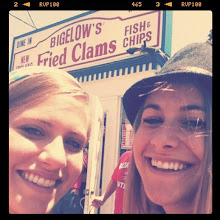In my most recent "coming of age"--that is, my transition into bonafide adulthood in the big, bad, real world--it has really hit me (pretty hard, actually) how much of the knowledge, advice, and forewarning my parents used to pump into my childhood brain are actually (and conveniently!) true. As kids, we claim to know it all, or, at the very least, claim that we know better than our parents about many of the conflicts, questions, and situations we find ourselves in as youngsters. Especially in those teenage years: I know how to get my homework done on time, I know how to drive a car, I know how to be on my own at beach week...All of this so-called knowledge we posses in these pivotal years of adolescence are stepping stones on the path to adulthood. Each "knowing" is challenged; some survive the tests of the real world, while others fail, and we hopefully spend our precious teenage years ironing out these differences, making adjustments to our failed "knowings" so they may point us toward success. Oddly, many "knowings"--or, intermittently, opinions--that travel with us out of adolescence and into our young adult (collegiate) lives, oftentimes end up on the chopping block as we slip into the shoes that the real world has to offer.
Of late, one "knowing" that shimmied its way through my college career, unaffected by the waves of my studies, is the complexity of time. Do not be mistaken--I know how to tell time, to manage my time, to take my time, to use my time wisely; however, I realize that the true meaning of time is elusive.
time (n): the system of those sequential relations that any event has to any other, as past present, or future (courtesy of dictionary.com)
So there it is. In a nutshell, there is past time--the then, present time--the now, and future time--the later. All three share fairly equal importance in my life, as I presume they do in many of my peers. I think of the past to plan for my present and future. I think of my future to plan for my present. And, I think of my present to decide where I would like my future to evolve...
Is your head spinning? Good! Mine is too...
In the frenzy of post-collegiate life--I loved my life in college, I am unsure of my satisfaction at work, I would love to becoming a food writer--I use all three tenses of time to describe the way I am feeling NOW. I ask: Which description should have the most bearing on my overall state-of-being? I am who I am because of my past, I am myself now in my present, but I will also become something different in the future. So many times to choose from, and so little of it to go around!
The answer to this dispute can be answered (or at least mulled over) by listening to the words of my father, who, many times, has insisted on my exposure to Eckhart Tolle, a spiritual teacher who contemplates the consequences that accrue as one neglects his or her focus on the present, the now. Dad's recommendation, once I took the bate, has been an influential tool in recognizing the truth and raw essence of endless situations. Tolle's advice, though terribly challenging to adopt, is the key to understanding our [time] on this earth, and how we can make the most of each day. Though I only recently agreed to test Dad's advice (to challenge my own "knowing"), I am astonished with the truth of Tolle's words: we should practice the power of now because it is the only tense of time that brings us to full consciousness and awareness of our own mind and body. It is the only tense of time that is essential to living. Without consciousness of now, past and future have no basis.
With this thought, I depart: settle it now, don't wait until later. Time is too precious, and the only way to ensure that we live life to the fullest is to take care of it now, to be satisfied now, to be kind and giving now...
12.24.2009
Subscribe to:
Post Comments (Atom)

No comments:
Post a Comment